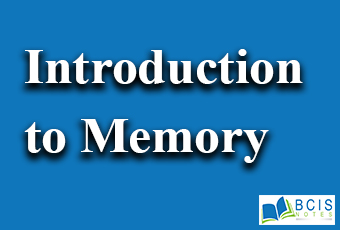
Introduction to Memory:
The process by which we encode, store, and retrieve information.
Encoding—- Storage—–Retrieval is all about Introduction to Memory.
The Information Processing Model
- Encoding (Automatic/Effortful)– Storage—Retrieval(Recall/Recognition)
- Automatic encoding: Automatic encoding occurs automatically with little or no effort.
- Effortful encoding: It requires attention and conscious effort.
Three Stage Memory
1. Sensory memory: the initial memory storage of information, lasting only an instant.
2.Short- term memory: Memory that holds information for 15-25 sec.
3.Long- term memory: a memory that stores information on a relatively permanent basis, although it may be difficult to retrieve.
Working Memory:
A set of active temporary memory stores that actively manipulate and rehearse information. Working memory is thought to contain a central processor that is involved in reasoning and decision making. Working memory permits us to keep information in an active state briefly so that we can do something with the information.
Long Term Memory
- Long- term memory refers to the unlimited capacity memory store that can hold information over lengthy periods of time.
- Memories are transferred into long- term memory, through rehearsal.
- If memories are transferred into long-term memory, they become relatively permanent
Types of Long-term Memory
- Declarative memory: Memory for factual information. g. Names, Faces, Dates, etc.
- Procedural memory: Memory for skills and habits, such as riding a bike or hitting a baseball; some times referred to as non-declarative memory
- Semantic memory: memory for general knowledge and facts about the world, as well as memory for the rules of logic that are used to deduce other facts. It is like the mental publication of facts.
- Episodic memory: memory for events that occur in a particular time, place or context.
Levels of Processing Theory
The theory of memory that emphasizes the degree to which new material is mentally analyzed.
- Explicit Memory: Intentional or conscious recollection of information. When we try to remember a name or date we have encountered or learned about previously, we are searching our explicit memory.
- Implicit Memory: Memories of which people are not consciously aware but that can affect subsequent performance and behavior.
- Skills that operate automatically and without thinking: such as jumping out of the path of an automobile coming toward us as we walk down the side of a road, are stored in implicit memory.
Forgetting: when memory fails
- Decay: It is the loss of information through nonuse. This explanation for getting assumes that memory, traces, the physical changes that take place in the brain when new material learned. Simply fade away over time.
- Interference: The phenomenon by which information in memory disrupts the recall of other information.
- Cue- dependent forgetting: Forgetting that occurs when there are insufficient retrieval cues to rekindle information that is in memory.
- Proactive Interference: Interference in which information learned earlier disrupts the recall of newer material.
- Retroactive Interference: Interference in which there is difficulty in the recall of information learned earlier because of later exposure to different material.
- Memory dysfunctions: Afflictions of forgetting
- Motivated forgetting: Forgetting for a reason. It is the concept of Freud, who suggested that we forget information because it’s threatening to us in some way. Ex; Bad date.
- Retrieval failure: Failure to retrieve information when needed.
You may also like Learning and Theories of Learning

Leave a Reply